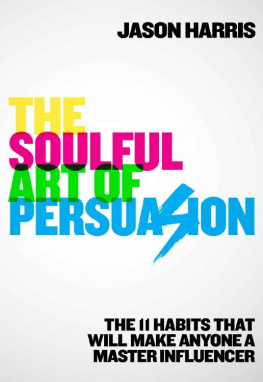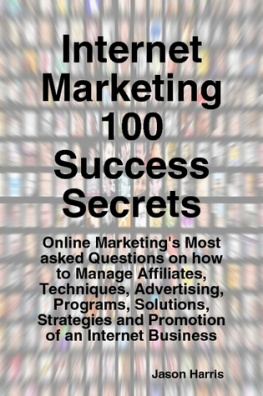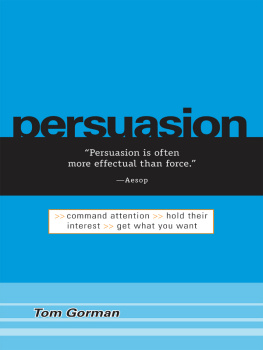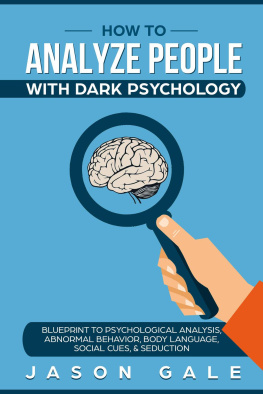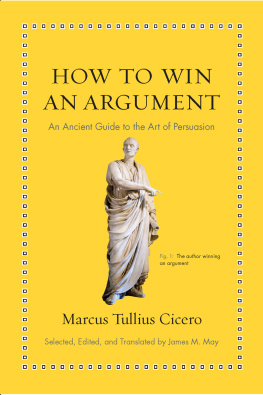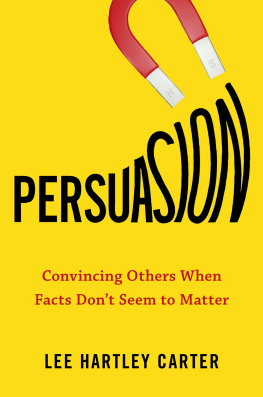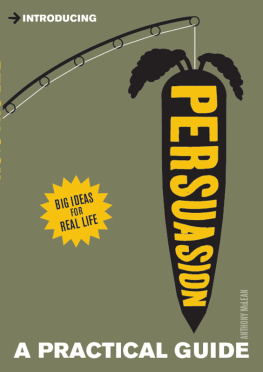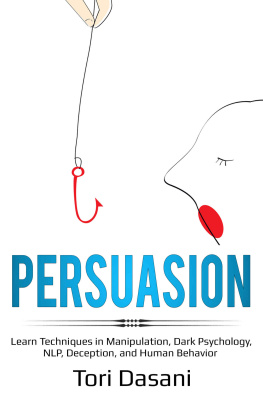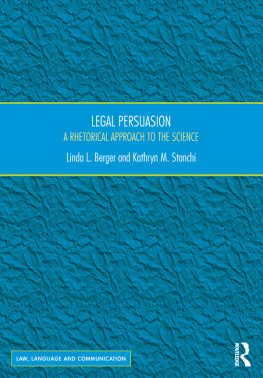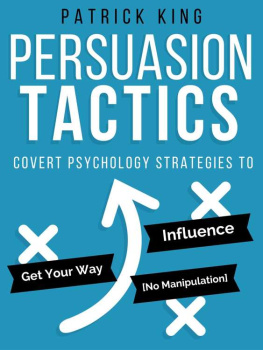All rights reserved.
Published in the United States by Currency, an imprint of Random House, a division of Penguin Random House LLC, New York.
CURRENCY and its colophon are trademarks of Penguin Random House LLC.
Currency books are available at special discounts for bulk purchases for sales promotions or corporate use. Special editions, including personalized covers, excerpts of existing books, or books with corporate logos, can be created in large quantities for special needs. For more information, contact Premium Sales at (212) 572-2232 or e-mail .
Names: Harris, Jason (Economist) author.
Title: The soulful art of persuasion: the 11 habits that will make anyone a master influencer / Jason Harris.
Description: 1 Edition. | New York: Currency, 2019. | Includes bibliographical references and index.
Subjects: LCSH: Success in business. | Persuasion (Psychology) | MarketingPsychological aspects. | Communication in marketing. | BISAC: BUSINESS & ECONOMICS / Negotiating. | BUSINESS & ECONOMICS / Marketing / Research.
Classification: LCC HF5386 .H2734 2019 | DDC 658.4/09019dc23 LC record available at https://lccn.loc.gov/2019003576
The Starting Point
Its hard to know who to trust anymore.
These days you cant look at a screen without being hit in the face with phony outrage, fake news, phishing scams, pop-up ads, or some other kind of online stupidity. Trust in government and mainstream media is near historical lows.
So, how do you persuade people in an environment where nobody has a reason to trust youwhere people are actively looking for reasons to be suspicious? Thats the challenge Ive spent my career grappling with. Because this much is clear: Americans sure as hell dont trust people in my line of work.
As the CEO of the creative advertising agency Mekanism, I belong to one of the least-trusted professions in the world. The only people considered more dishonest, according to a Gallup survey, are used-car salesmen and members of Congress. Thats some pretty questionable company.
These attitudes say a lot about the nature of influence in the modern era. Because if theres one thing all three of these professions have in common, its that each is in the business of persuasion. And when you picture someone who persuades for a living, two types of people spring to mind.
One is a slippery, fast-talking operator trying to pull one over on us, like the desperate real estate brokers in the Pulitzer Prizewinning play Glengarry Glen Ross. These are the sorts of characters who will tell you anything you want to hear, just to close a deal. They rely on vague promises, linguistic tricks, and fine print to hide the truth. They annoyingly keep repeating your name as if they know you. They are purposely inoffensive, way too self-aware, calculating, eager to please, and, in a word, soulless. Nobody wants to buy anything from these people; they make us want to figure out any excuse to say no.
At the other extreme are ideologues and loudmouths who are absolutely certain of their point of view and think anyone who disagrees with them is either stupid or dangerous. Think cable-news partisans and Internet trolls, Washington lobbyists and talk-radio pseudo-intellectuals. People in this group can be found at all points on our political spectrum. And they are incapable of convincing anybody who hasnt already embraced their exact same worldview.
As a leading practitioner in the advertising industry, I find myself up against these preconceptions daily. Yet Ive still managed to build a career around my ability to persuadewhether Im helping persuade consumers to buy certain products and services, persuading clients to hire our agency and to remain with us, persuading potential employees to come on board, or persuading our current employees to do their best work. Ive managed to do this in an industry in which persuasion happens in the most scrutinized environment imaginable.
Whats my secret? Well, Ive only found one solution that works in todays modern world: be the opposite of the greasy salesperson or the self-deluded blowhard everyone is on guard against. Be someone people can trust and relate to and even sometimes be moved by.
In other words, you have to be soulful.
Thats the driving idea behind The Soulful Art of Persuasion. And its based on the simple observation that whether someone persuades us or not has little to do with the exact words and phrases they use or the positions they take, but with the kind of person they really are.
Persuasive people arent skilled at sweet-talking their audience or figuring out what people want to hear. Rather, they are the individuals we want to agree with. They have qualities that compel us to be on their side and trust them, whatever the issue may be. Their persuasiveness comes from their soul.
The result is a form of influence that is far more powerful than reason alone. Logical arguments force us to accept a certain conclusion whether we like it or not, but soulful persuasion attracts us to a position. Genuine persuasion is about engaging rather than insisting. And this can actually be learned and made habitual with practice.
Im not going to give you a collection of tricks for closing a deal or making a quick sale. What I will show you is how to develop the personal habits that will allow you to be the kind of person that others trust, seek advice from, and want to collaborate with.
In short, Ill show you how to develop a more persuasive character.
Character is the collection of traits, dispositions, and virtues that someone consistently displays in their thoughts, emotional responses, and actionsthe qualities that reflect who we are. Developing a persuasive character means acquiring the character traits, habits of mind, and personal practices that, once truly internalized, will no doubt make you a more influential person.
The Four Principles
Personal dispositions that can make you persuasive fall into four main categories.
First, persuasive people are original. When they speak, you sense they are coming from a place of authenticity and honesty and that youre getting a glimpse of the real, unique themnot some prepackaged version designed to please you. For people who possess this virtue, their thoughts and actions are motivated by a deep understanding of who they are, always being themselves and building deep, long-term commitments; they are not motivated by the desire for short-term gains.
Second, persuasive people are generous. They give habitually and without expecting things in return. Im not just talking about money or physical gifts. Persuasive people also are generous with advice, opportunities, introductions, respect, and emotional positivity. You never get the impression that they are just looking out for themselves.
Third, persuasive people are empathetic. They are naturally curious about other people and seek out engaging conversations that delve past small talk into topics that genuinely matter to others. People of this sort are skilled collaborators and possess an outlook that emphasizes our common humanity, not our differences.

